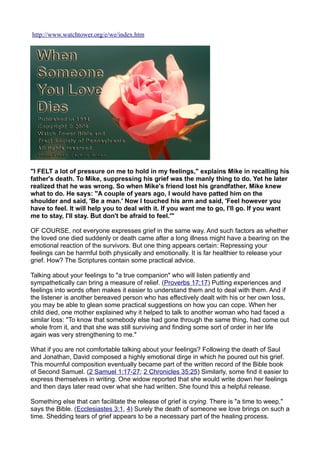
When someone you love dies
- 1. http://www.watchtower.org/e/we/index.htm "I FELT a lot of pressure on me to hold in my feelings," explains Mike in recalling his father's death. To Mike, suppressing his grief was the manly thing to do. Yet he later realized that he was wrong. So when Mike's friend lost his grandfather, Mike knew what to do. He says: "A couple of years ago, I would have patted him on the shoulder and said, 'Be a man.' Now I touched his arm and said, 'Feel however you have to feel. It will help you to deal with it. If you want me to go, I'll go. If you want me to stay, I'll stay. But don't be afraid to feel.'" OF COURSE, not everyone expresses grief in the same way. And such factors as whether the loved one died suddenly or death came after a long illness might have a bearing on the emotional reaction of the survivors. But one thing appears certain: Repressing your feelings can be harmful both physically and emotionally. It is far healthier to release your grief. How? The Scriptures contain some practical advice. Talking about your feelings to "a true companion" who will listen patiently and sympathetically can bring a measure of relief. (Proverbs 17:17) Putting experiences and feelings into words often makes it easier to understand them and to deal with them. And if the listener is another bereaved person who has effectively dealt with his or her own loss, you may be able to glean some practical suggestions on how you can cope. When her child died, one mother explained why it helped to talk to another woman who had faced a similar loss: "To know that somebody else had gone through the same thing, had come out whole from it, and that she was still surviving and finding some sort of order in her life again was very strengthening to me." What if you are not comfortable talking about your feelings? Following the death of Saul and Jonathan, David composed a highly emotional dirge in which he poured out his grief. This mournful composition eventually became part of the written record of the Bible book of Second Samuel. (2 Samuel 1:17-27; 2 Chronicles 35:25) Similarly, some find it easier to express themselves in writing. One widow reported that she would write down her feelings and then days later read over what she had written. She found this a helpful release. Something else that can facilitate the release of grief is crying. There is "a time to weep," says the Bible. (Ecclesiastes 3:1, 4) Surely the death of someone we love brings on such a time. Shedding tears of grief appears to be a necessary part of the healing process.
- 2. http://www.watchtower.org/e/we/index.htm You may find that for a time your emotions will be somewhat unpredictable. Tears may flow without much advance warning. One widow found that supermarket shopping (something she had often done with her husband) could reduce her to tears, especially when, out of habit, she reached for items that had been her husband's favorites. Be patient with yourself. And do not feel that you have to hold back the tears. Remember, they are a natural and necessary part of grieving. The Bible assures us: "Jehovah is near to those that are broken at heart; and those who are crushed in spirit he saves." (Psalm 34:18) Yes, more than anything else, a relationship with God can help you to cope with the death of someone you love. How? All the practical suggestions offered thus far have been based on or are in harmony with God's Word, the Bible. Applying them can help you cope. In addition, do not underestimate the value of prayer. The Bible urges us: "Throw your burden upon Jehovah himself, and he himself will sustain you." (Psalm 55:22) If talking out your feelings with a sympathetic friend can help, how much more will pouring out your heart to "the God of all comfort" help you!—2 Corinthians 1:3. One woman who lost a child in death recalls how the power of prayer helped her and her husband through their loss. "If we were home at night and the grief just became insurmountable, we would pray together out loud," she explains. "The first time we had to do anything without her—the first congregation meeting we went to, the first convention we attended—we would pray for strength. When we got up in the morning and the reality of it all seemed unbearable, we would pray to Jehovah to help us. For some reason, it was really traumatic for me to walk into the house by myself. And so every time I came home alone, I would just say a prayer to Jehovah to please help me to maintain some sort of calm." That faithful woman firmly and rightly believes that those prayers made a difference. You too may find that in response to your persistent prayers, 'the peace of God that excels all thought will guard your heart and your mental powers.'—Philippians 4:6, 7; Romans 12:12. The help that God supplies does make a difference. The Christian apostle Paul stated that God "comforts us in all our tribulation, that we may be able to comfort those in any sort of tribulation." True, divine help does not eliminate the pain, but it can make it easier to bear. That does not mean that you will no longer cry or will forget your loved one. But you can recover. And as you do, what you have experienced can make you more understanding and sympathetic in helping others to cope with a similar loss.—2 Corinthians 1:4.— Article taken from the Official Web Site of the Jehovah's Witnesses. For any information about this item please contact the Jehovah's witnesses in your area. Thank you.
